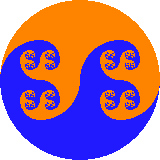
It is clear that every time thereīs more knowledge in less time. The more we go back in time, we notice that the advances are slower and lesser. It could be seen as an inverted pyramid. More precisely, itīs like a graphic of the function f(x)=ln(|x|)
The superior knowledge is based in earlier knowledge, and in inspiration and casual happenings, helping to develop the knowledge. The casual, aleatory facts and the inspiration or imagination would be outside the inverted pyramid, being also a base for superior knowledge. If one of this knowledges is proven to be wrong, all the knowledges based on it fall.
Then, one asks, what was the first knowledge that man had? Are we back in the problem of when did mankind become inteligent? No, knowledge is adquired far before inteligence. Young animals acquire knowledge of danger, survival, feeding, etc. It is encoded on their genomes .The genetic code itself is knowledge. Therefore, the first knowledge, from which all other knowledges are derived from, including the animal, would be the first biological molecule, that is, the begining of life. Then it could be said that life is knowledge, which is untrue.
No I ask myself: Are there limits to this every-time faster development of new knowledge?
Who knows?
Main